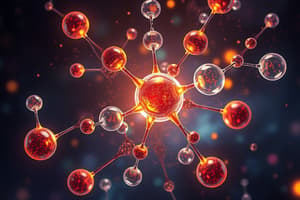Podcast
Questions and Answers
What are the core tenets of organic chemistry?
What are the core tenets of organic chemistry?
- Synthesis, structure, reactivity, mechanism (correct)
- Electrochemistry, stoichiometry, nuclear chemistry, kinetics
- Atomic structure, periodic table trends, gas laws
- Physical properties, inorganic compounds, thermodynamics, kinetics
Why are enantiomerically pure compounds important in pharmaceuticals?
Why are enantiomerically pure compounds important in pharmaceuticals?
- They are cheaper to produce
- They have longer shelf life
- They have higher toxicity levels
- They have specific biological activities (correct)
What distinguishes dynamic click chemistry from traditional click reactions?
What distinguishes dynamic click chemistry from traditional click reactions?
- It allows for rapid and reversible bond formation (correct)
- It is a slow process
- It does not involve molecular entities
- It involves irreversible bond formation
Which green solvent is recognized for facilitating efficient Pd-catalyzed C–H activations?
Which green solvent is recognized for facilitating efficient Pd-catalyzed C–H activations?
What is the primary advantage of boronic acid-based click chemistry in modern organic synthesis?
What is the primary advantage of boronic acid-based click chemistry in modern organic synthesis?
What practical applications are associated with nanographenes?
What practical applications are associated with nanographenes?
What is the focus of innovative synthetic methods in organic chemistry?
What is the focus of innovative synthetic methods in organic chemistry?
Which advanced analytical technique is used to clarify the relationship between structure and properties at atomic levels in organic chemistry?
Which advanced analytical technique is used to clarify the relationship between structure and properties at atomic levels in organic chemistry?
What is one of the emerging topics in organic chemistry mentioned in the text?
What is one of the emerging topics in organic chemistry mentioned in the text?
Which cutting-edge spectroscopic method is highlighted for its role in organic chemistry research?
Which cutting-edge spectroscopic method is highlighted for its role in organic chemistry research?
What is an example of an antibacterial product derived from innovative synthetic methods in organic chemistry?
What is an example of an antibacterial product derived from innovative synthetic methods in organic chemistry?
How do emerging fields mentioned in the text contribute to organic chemistry research?
How do emerging fields mentioned in the text contribute to organic chemistry research?
Flashcards are hidden until you start studying
Study Notes
Discovering the Building Blocks: Exploring Organic Chemistry
Organic chemistry delves into the realm of carbon-containing molecules and explores their behavior, interactions, and countless practical applications. At the heart of these investigations lies the intriguing world of synthesis, structure, reactivity, and mechanism—the core tenets of organic chemistry. Let's embark on an exploration of some fascinating facets of this field as outlined below.
Enantioselective Syntheses
Enantiomerically pure compounds have emerged as vital components in many areas such as pharmaceuticals and chiral catalysts. For instance, the synthesis of nanographenes demonstrates precise control over chiral elements in their structures, enabling the preparation of enantiomers separately.
Dynamic Click Chemistry
Dynamic click chemistry expands upon the concept of traditional click reactions, allowing for rapid and reversible formation of bonds between molecular entities. Boronic acid-based click chemistry stands out as one example of multiple advancements showcasing innovative and sustainable approaches to modern organic synthesis.
Green Solvents and Transition Metal-Catalyzed Processes
Hexafluoroisopropanol (HFIP) is gaining recognition due to its ability to facilitate efficient Pd-catalyzed C–H activations while remaining environmentally friendly. Other notable green solutions involve hydrogen peroxide, ionic liquids, deep eutectic solvents, and supercritical fluid technology.
Novel Biomedical Applications
Innovative synthetic methods target the creation of novel therapeutics, materials, and diagnostic tools. One exciting example entails the synthesis of a new antibacterial surfactant derived from apricot kernel oil, and another involves the development of prodrugs and photoactivatable agents.
Advanced Analytical Techniques
Highlighting cutting-edge spectroscopic methods like electrospray ionization mass spectrometry (ESI-MS), nuclear magnetic resonance (NMR), X-ray diffraction, and computational modeling clarifies the relationship between structure and properties at atomic levels.
Emerging Topics in Organic Chemistry
Contemporary issues such as water droplet chemistry, sustainable polymer design, and the integration of artificial intelligence within chemical sciences continue to push boundaries in organic chemistry research. These emerging fields promise to shape tomorrow's scientific landscape.
As the science of organic chemistry unfolds, researchers worldwide contribute to unveiling new frontiers of discovery. From the fundamentals of chemical principles to technological breakthroughs and societal benefits, the future holds great potential and endless opportunities for those willing to explore this captivating discipline.
Studying That Suits You
Use AI to generate personalized quizzes and flashcards to suit your learning preferences.




